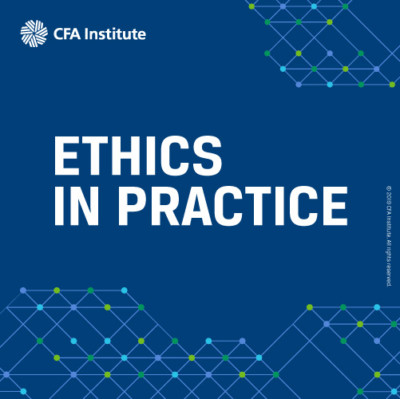Ethics in Practice: Trading on Pandemic Information. Case and Analysis–Week of 20 April
Analysis Now Posted!
This Ethics in Practice case is part of a series that CFA Institute began publishing in 2017. This particular case relates to ethical issues facing investment professionals in an era of global pandemic. Past cases are available to help you exercise your ethical decision-making skills in the CFA Institute Ethics in Practice Casebook, a compilation of over 100 previously published cases and corresponding analyses.
Case
Burlingame is a high-ranking government official who, because of her work with the intelligence agencies, is regularly briefed on potential threats to the country, both from a military and economic perspective. During a recent briefing, she receives information from the intelligence community about the strong likelihood of the onset of a global pandemic in next three months. She recognizes that the pandemic will result in widespread economic shock and have a devastating negative effect on global capital markets. Burlingame contacts her investment adviser, O’Donnell, and directs him to liquidate her investments. O’Donnell should
- sell the investments as directed by the client.
- not execute the trades because they are a product of material nonpublic information.
- refuse to execute the trades because Burlingame’s request is not in line with her previously established investment objectives, mandates, and constraints.
- execute the trades but disclose any possible illegal activity to appropriate authorities.
- none of the above.
Analysis
The circumstances of this case indicate that Burlingame is seeking to liquidate her investments based on material nonpublic information received about the economy because of her government position. CFA Institute Standard of Professional Conduct II(A): Material Nonpublic Information (MNPI) prohibits CFA Institute members who possess material nonpublic information from acting or causing others to act on that information. Obviously, the information about the oncoming pandemic is both material (because it will have an effect on securities prices and a reasonable investor would want to know the information before making an investment decision), and nonpublic (because it is not widely distributed to the investing public). Clearly Burlingame is in possession of MNPI and the facts suggests Burlingame is seeking to trade on this information to avoid losses to her portfolio.
The key issue in this case is whether O’Donnell is in possession of MNPI or is aware that Burlingame is seeking to trade based on material nonpublic information. The CFA Insitute Ethical Decision-Making framework, in part, asks you to identify relevant facts before deciding on a course of conduct to follow to act in an ethical manner. In the facts provided, there is no indication that O’Donnell is in possession of MNPI or that Burlingame has told O’Donnell the reasons for wanting to liquidate her portfolio (B). CFA Institute Standard III(E): Preservation of Confidentiality would allow O’Donnell to disclose illegal activity on the part of Burlingame to the authorities (D). But as noted, there is no indication from the facts that O’Donnell is aware that Burlingame is trading on MNPI. If Burlingame, as a government official, has trading protocols placed on her, O’Donnell should know and understand those to ensure that the trading is done within those parameters.
Generally, anytime an advisory client seeks to change their investment portfolio, it is appropriate for their adviser to conduct a suitability analysis to determine whether the directive is consistent with the previously provided investment goals, objectives, risk tolerances, and so on of the client (C). This is consistent with CFA Institute Standard III(C): Suitability, which requires CFA Institute members to determine whether an investment is suitable for the client’s financial situation and consistent with the client’s written objectives, mandates, and constraints before taking an investment action. Burlingame’s request to liquidate her portfolio diverges from her long-term financial goals. This request may raise a red flag for O’Donnell. But, ultimately, if Burlingame demands that the trades be made, O’Donnell, without any evidence of illegal activity, must meet his duty to his client by following her directives. Choice A is the best response given the facts provided.
CFA Institute Members: This case qualifies for 0.25 Professional Learning (PL) hours, including 0.25 hours in the content areas of Standards, Ethics, and Regulations (SER). Be sure to visit the Continuing Education tracker to receive 0.25 PL/0.25 SER credits for completing this case.
Let us know what you think of Ethics in Practice by taking this short survey.
Have an idea for a case for us to feature? Send it to us at [email protected].
More About the Ethics in Practice Series
Just as you need to practice to become proficient at playing a musical instrument, public speaking, or playing a sport, practicing assessing and analyzing situations and making ethical decisions develops your ethical decision-making skills. The Ethics in Practice series gives you an opportunity to “exercise” your ethical decision-making skills. Each week, we post a short vignette, drawn from real-world circumstances, regulatory cases, and CFA Institute Professional Conduct investigations, along with possible responses/actions. We then encourage you to assess the case using the CFA Institute Ethical Decision-Making Framework and through the lens of the CFA Institute Code of Ethics and Standards of Professional Conduct.
Image Credit: ©CFA Institute

